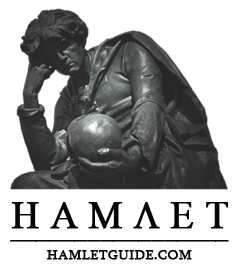

![]()
| Vysotsky's Hamlet (Soviet Union) |
Essential
information regarding Kozintsev's film version
In Russia, Hamlet remains first of all a person - his individuality itself challenges authority. In 1971, at Moscow’s Taganka Theater, Yuri Lyubimov opened a production that ran in repertory until 1980 (217 performances in all), when the early death of Vladimir Vysotsky, the poet-singer-actor who had played the lead and given the production its special character, brought it to a premature end. Lyubimov had been put in charge of the Taganka in 1964, the year that Kozintsev’s Hamlet appeared. The theater’s beginnings were made possible by the Khrushchev "thaw", although it soon began to generate a little too much heat for the wan Soviet spring. Eventually becoming an emblem of social and moral opposition to the regime, the Taganka succeeded in feeding the spiritual hunger of oppressed Russians. In purely theatrical terms, Lyubimov’s Hamlet was noteworthy for the cinematic montage of the mise-en-sceneand the presence of a dominant stenographic image - a ubiquitous, constantly moving curtain (designed by David Borovsky); but far more important was its cultural role and the spiritual power of its leading performer. When he took on Hamlet, Vysotsky was already well known as a troubadour of spiritual freedom - he was "the living soul and conscience of his time" (Gershkovich, 129), much loved throughout the Soviet Union because his songs spoke truth in the oblique ways typical of heavily censored societies. He died during the Moscow Olympics, and people abandoned their stadiums and TV sets to participate in a spontaneous memorial service. Though there had been no announcement of his death in the press, within hours everyone in Moscow knew of it, and thousands gathered near the theater, where his legendary guitar was displayed, to recite his poems and honor his memory. At the funeral a few days later, mourners jammed the streets all around the Taganka, but only a few were able to file past the coffin before it was whisked away, while someone on a rooftop with a loud voice described the scene to the pressing crowd. "After Vysotsky’s funeral," said Lyubimov, "I began to respect the people of Moscow". For all the obvious differences, the scene is reminiscent of David Garrick’s brilliant obsequies two hundred years earlier. Those were officially sanctioned, orderly, designed to honor the greatest English actor as a national hero. Vysotsky’s were unofficial and disorderly, a sign of repressed desire for freedom in defiance of oppressive authority. But Vysotsky was also a national hero, and, like Garrick, he was especially identified with Hamlet. In part, he appeared with his guitar. The production began on a bare stage, open to the whitewashed back wall, which was adorned only with a heavy wooden cross. Two silhouetted gravediggers swigged vodka and tossed dirt and skulls out of an open grave downstage (the grave remained throughout). Hamlet, in casual modern dress, approached the grave and, accompanying himself on the guitar, recited Pasternak’s Hamlet poem from the banned Dr. Zhivago:
Pasternak’s great translation of Hamlet defined the character in Russian terms - serious, dedicated, self-sacrificing; he is a witness, even a Christ-like sufferer who "gives up his will in order to ‘do the will of him that sent him’ Hamlet is not a drama of weakness, but of duty and self-denial." He has been allotted the role of "judge of his own time and servant of the future" (Pasternak, quoted in Rowe 148). His reality, as the poem suggest, is interwoven with that of the actor, in struggle with himself, putting himself on the line in order to explode "the misrepresentations which produced moral failure in Soviet life" (Golub 161):
The visual and
symbolic dominance of the Taganka’s mobile curtain was designed to
carry the production’s distinctively Soviet meaning. Coarsely woven
of wool, though appearing like macramé with "threads hanging in evil
bundles", the curtain controlled the action, falling from the
ceiling after the opening song, moving around and between the
actors, |
![]()